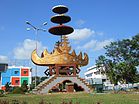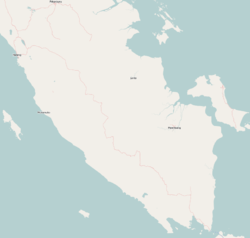Bandar Lampung
Bandar Lampung | |
|---|---|
| City of Bandar Lampung Kota Bandar Lampung | |
    Clockwise: Adipura Monument, Aerial view of Southern Bandar Lampung, Tanjung Karang Station, Siger Monument | |
 Seal | |
| Motto(s): Ragom Gawi (Language and Culture) | |
 Location within Lampung | |
| Coordinates: 5°27′0″S 105°16′0″E / 5.45000°S 105.26667°ECoordinates: 5°27′0″S 105°16′0″E / 5.45000°S 105.26667°E | |
| Country | Indonesia |
| Province | Lampung |
| Founded | 17 June 1682 |
| Government | |
| • Type | City |
| • Mayor | |
| • Vice Mayor | Deddy Amrullah |
| Area | |
| • Total | 197.22 km2 (76.15 sq mi) |
| Elevation | 15 m (49 ft) |
| Population (2020 Census)[1] | |
| • Total | 1,166,066 |
| • Density | 5,900/km2 (15,000/sq mi) |
| Human Development Index | |
| • HDI (2007) | 0.742 |
| Time zone | UTC+7 (Indonesia Western Time) |
| Postcodes | 35111 to 35246[2] |
| Area code | (+62) 721 |
| Website | bandarlampungkota |
Bandar Lampung (Lampungese: ![]() , Kutak Bandarlampung) is the capital and largest city of the Indonesian province of Lampung. Located on the southern tip of Sumatra, Bandar Lampung was originally called Tanjungkarang–Telukbetung, since it was a unification of two major settlements in Lampung, before being renamed in 1983.[3]
, Kutak Bandarlampung) is the capital and largest city of the Indonesian province of Lampung. Located on the southern tip of Sumatra, Bandar Lampung was originally called Tanjungkarang–Telukbetung, since it was a unification of two major settlements in Lampung, before being renamed in 1983.[3]
The city proper and South Lampung Regency (which borders the city on its northern and eastern sides) are major transmigrasi recipients; in testimony thereof, it has become the fourth-largest city in Sumatra, after Medan, Palembang and Pekanbaru. The city's area is about 197.22 km², with a Census population of 790,057 in 2005, 881,801 in 2010, 977,686 in 2015 and 1,166,066 in 2020.[4]
History[]
Early history[]
A report by the Banten regent William Craft to Governor-General Cornelis Speelman states that, on the basis of a description provided by Pangeran Aria Dipati Ningrat on 17 June 1682, "Lampung-Telokbetong at the edge of the sea is the seat of power of a Dipati Temenggung Nata Negara, with power over three thousand people". This date would later be adopted by the city administration as its official founding date.[5]
Dutch East Indies[]
Under the Dutch colonial administration, 1912 Staatsblad 462 codified the city as being part and parcel of the Onderafdeling Telokbetong, composed of present-day Teluk Betung and its environs. The Onderafdeling's capital was Tanjung Karang, whilst Telukbetung itself served as the seat of government for the Karesidenan Lampung.[5]
Under Japanese occupation[]
During the Japanese colonial era, present-day Bandar Lampung was administered as a city (市, shi), led by a Japanese mayor (市長, shicho) who was assisted by an Indonesian deputy mayor (副市長, fuku-shicho).[5]
Post-Independence[]
Tanjung Karang and Telukbetung initially fell under the jurisdiction of South Lampung Regency, until a 1948 law consolidated the two and elevated them to independent city status.[5]
Administrative districts[]

At the time of the 2010 Census, the city of Bandar Lampung was divided into thirteen administrative districts (Indonesian: kecamatan), but subsequently seven additional districts have been created by the splitting of existing districts, bringing the total to twenty districts. The new districts are Bumi Waras, Enggal, Kedamaian, Labuhan Ratu, Langkapura, Teluk Betung Timur (East Teluk Betung) and Way Halim.
The twenty districts are tabulated below with their areas and their populations at the 2010 Census[6] and the 2020 Census.[7] The table also includes the number of administrative urban villages (kelurahan) in each district and its postal codes.
| Name | Area in km2 |
Pop'n Census 2010[6] |
Pop'n Census 2020[8] |
No. of kelurahan |
Post codes |
|---|---|---|---|---|---|
| Teluk Betung Barat (West Teluk Betung) |
11.02 | 59,396 | 41,096 | 5 | 35232-35239 |
| Teluk Betung Timur (East Teluk Betung) |
14.83 | (a) | 53,874 | 6 | 35231-35237 |
| Teluk Betung Selatan (South Teluk Betung) |
3.79 | 92,156 | 42,870 | 6 | 35211-35229 |
| Bumi Waras | 3.75 | (a) | 63,166 | 5 | 35224-35228 |
| Panjang | 15.75 | 63,504 | 80,811 | 8 | 35241-35246 |
| Tanjung Karang Timur (East Tanjung Karang) |
2.03 | 89,324 | 43,076 | 8 | 35121-35126 |
| Kedamaian | 8.21 | (a) | 57,905 | 8 | 35122-35133 |
| Teluk Betung Utara (North Teluk Betung) |
4.33 | 62,663 | 53,552 | 6 | 35211-35215 |
| Tanjung Karang Pusat (Central Tanjung Karang) |
4.05 | 72,385 | 55,925 | 7 | 35111-35119 |
| Enggal | 3.49 | (a) | 28,649 | 6 | 35111-35127 |
| Tanjung Karang Barat (West Tanjung Karang) |
14.99 | 63,747 | 65,554 | 7 | 35151-35159 |
| Kemiling | 24.24 | 71,471 | 88,574 | 9 | 35153-35158 |
| Langkapura | 6.12 | (a) | 43,569 | 5 | 35152-35157 |
| Kedaton | 4.79 | 88,314 | 57,336 | 7 | 35141-35148 |
| Rajabasa | 13.53 | 43,257 | 57,589 | 7 | 35144-35145 |
| Tanjung Senang | 10.63 | 41,225 | 62,168 | 5 | 35141-35143 |
| Labuhan Ratu | 7.97 | (a) | 52,393 | 6 | 35142-35149 |
| Sukarame | 14.75 | 70,761 | 67,725 | 6 | 35131 |
| Sukabumi | 23.60 | 63,598 | 75,870 | 7 | 35122-35245 |
| Way Halim | 5.35 | (a) | 74,364 | 6 | 35123-35141 |
| Total city | 197.22 | 881,801 | 1,166,066 | 126 |
Note: (a) the 2010 population of this new district is included in the figures for the district(s) from which it was separated.
Climate[]
Bandar Lampung has a tropical rainforest climate (Af) with heavy rainfall year-round. Rain gets noticeably heavier from November to April.
| hideClimate data for Bandar Lampung | |||||||||||||
|---|---|---|---|---|---|---|---|---|---|---|---|---|---|
| Month | Jan | Feb | Mar | Apr | May | Jun | Jul | Aug | Sep | Oct | Nov | Dec | Year |
| Average high °C (°F) | 30.3 (86.5) |
31.0 (87.8) |
31.6 (88.9) |
32.0 (89.6) |
31.9 (89.4) |
31.7 (89.1) |
31.3 (88.3) |
31.4 (88.5) |
31.4 (88.5) |
32.0 (89.6) |
32.0 (89.6) |
31.1 (88.0) |
31.5 (88.7) |
| Daily mean °C (°F) | 26.4 (79.5) |
26.7 (80.1) |
27.2 (81.0) |
27.3 (81.1) |
27.2 (81.0) |
26.8 (80.2) |
26.6 (79.9) |
26.6 (79.9) |
26.7 (80.1) |
27.2 (81.0) |
27.3 (81.1) |
26.9 (80.4) |
26.9 (80.4) |
| Average low °C (°F) | 22.6 (72.7) |
22.5 (72.5) |
22.8 (73.0) |
22.7 (72.9) |
22.5 (72.5) |
22.0 (71.6) |
21.9 (71.4) |
21.8 (71.2) |
22.1 (71.8) |
22.4 (72.3) |
22.7 (72.9) |
22.7 (72.9) |
22.4 (72.3) |
| Average precipitation mm (inches) | 280 (11.0) |
281 (11.1) |
255 (10.0) |
175 (6.9) |
135 (5.3) |
119 (4.7) |
100 (3.9) |
121 (4.8) |
118 (4.6) |
139 (5.5) |
149 (5.9) |
250 (9.8) |
2,122 (83.5) |
| Source: [9] | |||||||||||||
Transportation[]
Air[]
Bandar Lampung is served by Radin Inten II Airport (TKG), in the neighbouring county of South Lampung. The airport can be accessed by public transportation, such as bus and mini bus.
Road transport[]


Bandar Lampung has several road transportation alternatives. The most popular is a minibus called angkot, an abbreviation from Angkutan Kota (literally translated as City Transportation). They serve routes throughout the city, operated privately and cheaply. Usually, an angkot covers some area between Tanjung Karang (heart of Bandar Lampung) and an urban area. Currently, routes covered are Tanjung Karang - Garuntang, Tanjung Karang - Teluk Betung, Tanjung Karang - Rajabasa, Tanjung Karang - Sukarame, Tanjung Karang - Langkapura and many more.
Bandarlampung Transportation Office has announced that in October 2011 will serve two of seven routes planned by bus rapid transit — the Rajabasa-Sukaraja and Sukaraja-Korpri housing complex in Sukarame.[10]
Rail transport[]
Tanjung Karang Station in Bandar Lampung is the terminus of the railway service from Palembang, although the railway track continues all the way until Panjang harbor and Tarahan coal offloading point. Many express trains connecting this city and Palembang, including Limex Sriwijaya and Rajabasa Express.
Education[]
In 2009, Bandar Lampung has a literacy rate of 94.3%,[11] slightly increased from 2005 which was 93.5%. However, the high school participation rate kept decreasing from 69.2% (2007) down to 61.4% (2009).[12] On the other hand, high school participation rate in Indonesia rose from 54.6% in 2007, to 55.8% in 2010.[13]

There are some notable high schools and universities in Bandar Lampung such as SMP Negeri 2 Bandar Lampung (public), SMP Negeri 1 Bandar Lampung (public), SMA Negeri 2 Bandar Lampung (public, known as Smanda), SMA Negeri 9 Bandar Lampung (public, known as Smalan), SMA Negeri 1 Bandar Lampung (public, known as Smansa), SMA Al-Kautsar Bandar Lampung (private), SMA Fransiskus Bandar Lampung (private), SMA Xaverius Pahoman (a Catholic private school teaching students from kindergarten to high school, locally known as Xavepa), Lampung University (public, locally known as Unila), Bandar Lampung University (private, locally known as UBL: Universitas Bandar Lampung),Muhammadiyah University of Lampung (known as UML: Universitas Muhammadiyah Lampung and Malahayati University (private). In March 2011, Unila already had 70,866 alumni.[14]
Sister cities[]
Bandar Lampung is twinned with:
 Pekanbaru, Indonesia
Pekanbaru, Indonesia Kuantan, Malaysia
Kuantan, Malaysia Ipoh, Malaysia
Ipoh, Malaysia Split, Croatia
Split, Croatia
See also[]
References[]
- ^ Badan Pusat Statistik, Jakarta, 2021.
- ^ "Kode POS Kota Bandar Lampung - urut Kecamatan/Distrik - hal 1". kodepos.nomor.net.
- ^ "Peraturan Pemerintah Nomor 24 Tahun 1983". President of Republic Indonesia. 1983. Retrieved 5 July 2011.
- ^ Badan Pusat Statistik Kota Bandar Lampung.
- ^ Jump up to: a b c d "PORTAL Berita Resmi Pemerintahan Kota Bandar Lampung". bandarlampungkota.go.id. Retrieved 3 June 2020.
- ^ Jump up to: a b Biro Pusat Statistik, Jakarta, 2011.
- ^ Badan Pusat Statistik, Jakarta, 2021.
- ^ Badan Pusat Statistik, Jakarta, 2021.
- ^ "Lampung Town climate: Average Temperature, weather by month, Lampung Town weather averages - Climate-Data.org". en.climate-data.org.
- ^ "Bandarlampung to unveil BRT as passenger-friendly transport". 22 September 2011.
- ^ "Angka Melek Huruf Penduduk berumur 15 tahun ke atas menurut Kabupaten/Kota 2005-2009" (PDF). Badan Pusat Statistik Provinsi Lampung, Indonesia. 2010. Archived from the original (PDF) on 26 March 2012. Retrieved 3 July 2011.
- ^ "Angka Partisipasi Sekolah menurut Kabupaten/Kota" (PDF). Badan Pusat Statistik Provinsi Lampung, Indonesia. 2010. Archived from the original (PDF) on 26 March 2012. Retrieved 3 July 2011.
- ^ "Indikator Pendidikan Tahun 1994-2010". Badan Pusat Statistik. 2010. Archived from the original on 17 July 2011. Retrieved 3 July 2011.
- ^ "WISUDA: Unila Lahirkan 1.403 Sarjana". Lampung Post. 16 March 2011. Retrieved 3 July 2011.[permanent dead link]
External links[]
| Wikivoyage has a travel guide for Bandar Lampung. |
| Wikimedia Commons has media related to Bandar Lampung. |
- Bandar Lampung
- Populated places in Lampung
- Provincial capitals in Indonesia







